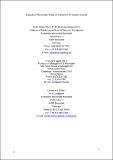| dc.contributor.author | Stock, Ruth Maria | |
| dc.contributor.author | von Hippel, Eric A | |
| dc.contributor.author | Gillert, Nils Lennart | |
| dc.date.accessioned | 2020-03-03T19:44:34Z | |
| dc.date.available | 2020-03-03T19:44:34Z | |
| dc.date.issued | 2016-01 | |
| dc.date.submitted | 2015-09 | |
| dc.identifier.issn | 0048-7333 | |
| dc.identifier.uri | https://hdl.handle.net/1721.1/123986 | |
| dc.description.abstract | Via a study of innovating and non-innovating German consumers, we explore links between the “Big Five” personality traits and successful accomplishment of three basic innovation process stages by consumer-innovators: (1) generating an idea for a new product or product improvement, (2) developing a prototype that implements that idea, and (3) diffusing the innovation to others. We find that personality traits are significantly associated with success differ at each stage. First, those who score higher on openness to experience are significantly more likely to have new product ideas. Second, being introverted and conscientious is significantly associated with successful prototyping. Third, those who possess high levels of conscientiousness are more likely to successfully commercially diffuse their innovations, whereas, in contrast, conscientiousness lowers the likelihood of successful peer-to-peer diffusion.
Since the personality traits associated with successful completion of each stage differ, and the same individual with the same traits must traverse each stage in sequence, we find that personality traits strongly affect the likelihood of overall success. That is, an individual innovator with a personality profile highly favorable to successful completion of all stages is several times more likely to successfully complete all three stages than is an individual with a highly unfavorable profile. We suggest solutions to this practical problem, and also offer suggestions for further research.
Keywords: Consumer innovation; Personality; Diffusion; Product solution; User innovation | en_US |
| dc.language.iso | en_US | |
| dc.publisher | Elsevier BV | en_US |
| dc.relation.isversionof | http://dx.doi.org/10.1016/j.respol.2015.12.002 | en_US |
| dc.rights | Creative Commons Attribution-NonCommercial-NoDerivs License | en_US |
| dc.rights.uri | http://creativecommons.org/licenses/by-nc-nd/4.0/ | en_US |
| dc.source | Prof. von Hippel | en_US |
| dc.title | Impacts of personality traits on consumer innovation success | en_US |
| dc.type | Article | en_US |
| dc.identifier.citation | Stock, Ruth Maria et al. "Impacts of personality traits on consumer innovation success." Research Policy 45, 4 (May 2016): 757-769 © 2015 Elsevier B.V. | en_US |
| dc.contributor.department | Sloan School of Management | en_US |
| dc.contributor.approver | von Hippel, Eric A. | en_US |
| dc.contributor.mitauthor | von Hippel, Eric A (mitid:900009936 orcidid:0000-0002-7235-1032) | en_US |
| dc.relation.journal | Research Policy | en_US |
| dc.eprint.version | Author's final manuscript | en_US |
| dc.type.uri | http://purl.org/eprint/type/JournalArticle | en_US |
| eprint.status | http://purl.org/eprint/status/PeerReviewed | en_US |
| dspace.embargo.terms | N | en_US |
| dspace.date.submission | 2019-04-04T14:08:38Z | |
| mit.journal.volume | 45 | en_US |
| mit.journal.issue | 4 | en_US |
| mit.license | PUBLISHER_CC | en_US |
| mit.metadata.status | Complete | |
